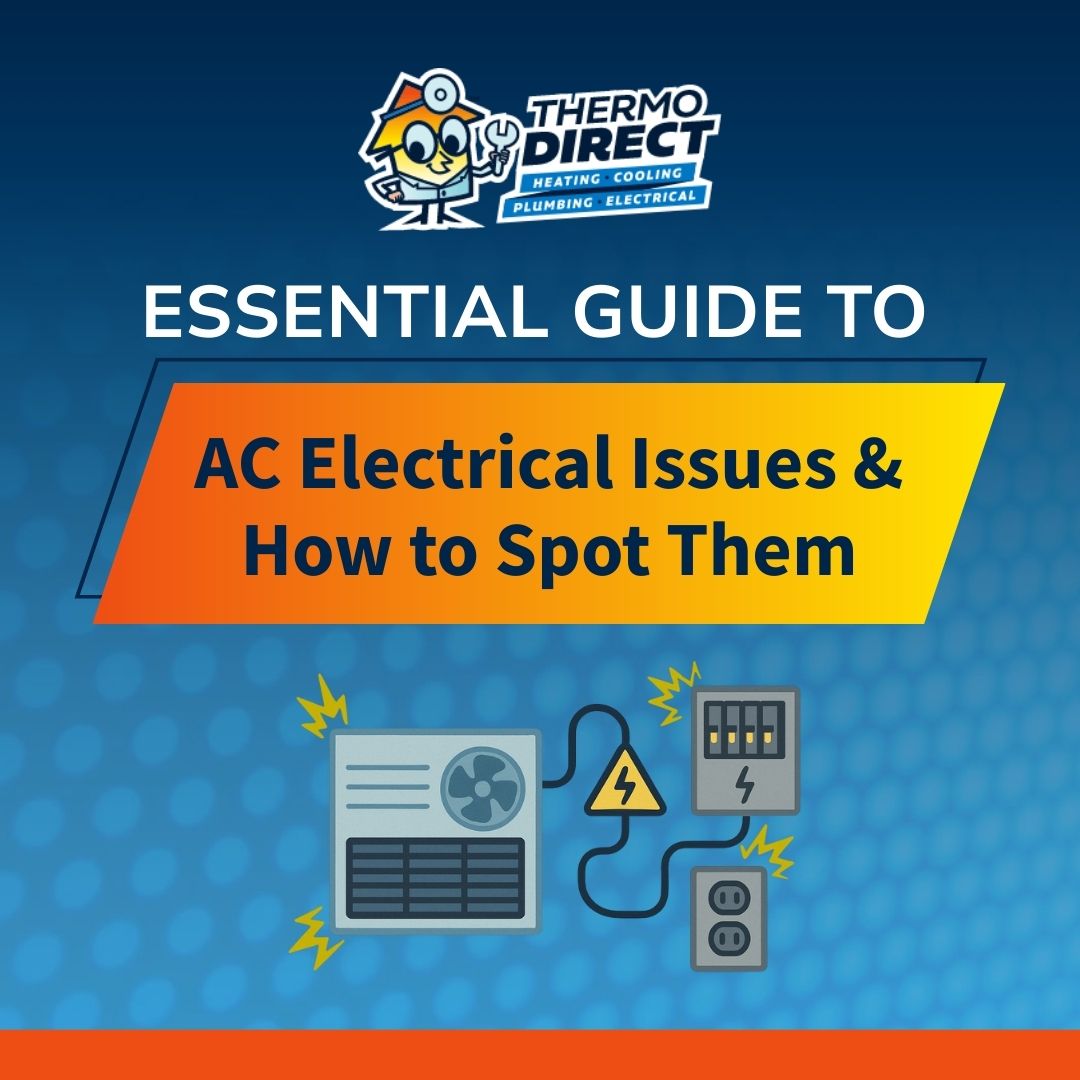Quick Recap
- AC electrical issues are common because most air conditioning systems rely on electricity to operate.
- Examples of common problems include faulty wiring, a tripped breaker, thermostat issues, and a failing capacitor.
- Homeowners should look for early warning signs and follow proper safety measures when troubleshooting AC electrical problems.
Why Electrical Issues Are a Common AC Problem
If you encounter an AC problem, it could be due to an electrical issue. Electrical issues are common in air conditioners because most systems rely entirely on electricity and all related components to operate. If something goes wrong, it can lead to several different AC electrical problems. Fortunately, the team of experts at Thermo Direct Heating, Cooling, Plumbing, & Electrical has some tips to help you identify these AC electrical issues in your Raleigh, NC, home.
Common Electrical Problems in Air Conditioners
While some AC-related electrical problems are complex or difficult to spot at first, more common AC electrical issues may also occur. These are some of the most common issues homeowners encounter with their AC’s electrical system.
Faulty wiring and loose connections
AC wiring problems are fairly common, especially when the wiring becomes damaged due to age, rust, or corrosion. When the wiring is faulty, it can no longer make a good connection to the AC system, disrupting the flow of electricity and causing the air conditioner to shut down.
Your air conditioner’s vibration may also cause loose connections, which can lead to the system intermittently shutting off or short-cycling. Both of these wiring problems usually lead to disruption in operation and performance, affecting your comfort during the summer.
Tripped circuit breakers or blown fuses
A circuit breaker trips when the system is overloaded, and this can happen to your air conditioner and other major appliances. When the breaker trips, it can no longer send electrical current to the AC. Fortunately, it’s easy to reset a tripped breaker by flipping it back to the “on” position inside your home’s main electrical panel.
A blown fuse may occur if the system receives a surge of power, causing it to shut off to prevent overheating or a fire. If you have a blown fuse, you’ll need to replace it yourself or have an expert from Thermo Direct replace it for you.
Capacitor failures
A capacitor stores and releases electrical energy. This component communicates with your air conditioner’s motors, instructing them when to start running. Signs of AC electrical issues related to the capacitor include the AC not turning on at all, the unit blowing warm air, or a loud humming noise.
Thermostat and control board issues
The thermostat is the brain of your air conditioner, and if it has an electrical problem, such as a control board issue, it can’t communicate with the system. Loose wiring inside the thermostat is another common AC electrical problem. Make sure your thermostat is powered on, and then lower the temperature to see if it activates the AC. If not, it may need rewiring, a new control board, or a thermostat replacement.
How To Spot Electrical Problems in Your AC
Knowing how to spot AC electrical issues is important for making sure you get the necessary air conditioner repairs. Here are some early warning signs of electrical AC problems, along with safety precautions to take before performing any air conditioner electrical troubleshooting.
What are the early warning signs?
Look for these early warning signs that may indicate an AC electrical problem:
- Buzzing or humming during startup
- The air conditioner won’t turn on
- Sudden burning odor coming from the AC unit
- Lights continually dim when the air conditioner starts up
- Blowing warm air or not cooling your home, which may be due to a failed motor or compressor
Safety precautions before troubleshooting
AC electrical issues can be dangerous and may cause a fire, electrical shock, or burns. Follow these safety precautions before troubleshooting AC electrical problems:
- Turn off the power at the circuit breaker before troubleshooting or working on electrical problems.
- Wear the proper safety gear, including eye protection and gloves, to prevent injury.
- Always make sure the work area is dry, especially if you see water or suspect a leak, and never work on electrical components if the area is wet.
- If you notice a burning smell, turn off your AC at the breaker and contact an HVAC professional right away.
Can You Fix AC Electrical Issues Yourself?
You may be able to fix certain minor AC electrical issues yourself, such as a tripped circuit breaker. However, when it comes to dealing with live electricity, you should always rely on the help of an experienced electrician or HVAC technician. Major issues, such as faulty wiring, leaks, and major AC component malfunctions, are best addressed by the trusted pros at Thermo Direct.
How Professional Repair Saves You Money and Extends AC Life
Here’s how professional repair saves you money and extends the life of your air conditioner:
- Professionals know the proper safety precautions to take when addressing electrical issues to prevent further damage and prolong your system’s lifespan.
- Most AC manufacturers require professional repairs to keep your warranty valid.
- Scheduling a professional repair as soon as you notice an electrical problem helps you address it early before it becomes more severe.
- Only the pros have the experience, training, tools, and techniques required to perform electrical AC repairs safely and correctly.
- Many companies offer coupons and discounts to help you save money.
Service Areas for AC Electrical Repair in and Around Raleigh, NC
Thermo Direct proudly serves homeowners in these zip codes:
- 27601
- 27603
- 27604
- 27605
- 27606
- 27607
- 27608
- 27609
- 27610
- 27612
- 27613
- 27614
- 27615
- 27616
- 27617
- And nearby Wake County communities
Book Your AC Electrical Repair or Inspection With Thermo Direct Today!
Thermo Direct Heating, Cooling, Plumbing, & Electrical provides professional electrical repairs and inspections for homeowners in Raleigh and the surrounding areas. Contact us today to schedule an AC electrical repair or inspection.
Frequently Asked Questions
Why does my AC keep tripping the circuit breaker?
If your AC keeps tripping the circuit breaker, it could be due to a faulty capacitor, a failing compressor, or airflow issues, such as a dirty air filter. Damaged wiring, loose connections, or a damaged breaker could also cause it.
What are the signs of faulty AC wiring?
Some of the signs of faulty AC wiring include burning odors, a faint buzzing sound, and electrical outlets connected to your AC unit feeling warm to the touch. Other signs include visibly frayed or damaged wiring or the AC not turning on.
What causes an air conditioner fuse to blow?
Some common reasons why your air conditioner’s fuse or fuses may blow include electrical overload or a short circuit within the system. Other causes may include low refrigerant levels, dirty condenser coils, or a malfunctioning AC compressor or fan motor.










